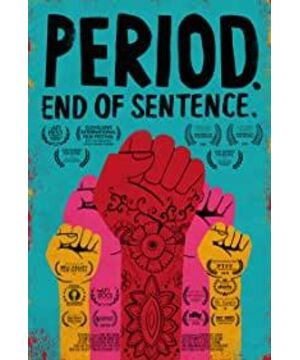During the emergence of modern civilization, women were discriminated against in almost all traditional cultures in the world, especially in India. From the unreasonable dowry system to the burial of the inhumane widow, to the gang rape case that shocked the world, we refreshed our bottom line time and time again: what kind of unbearable life Indian women are living.
Due to the lack of voice, Indian women have gradually become a group of silent victims in people's eyes.
But in fact, they have always resisted.
The best documentary short film "Lunar Revolution" of this year's Academy Awards recorded a raging resistance movement with the most realistic shots.
In a village in Hapur, 60 kilometers east of the capital of Delhi, India, a few village girls suddenly became extremely shy and coy when they were asked about menstruation. The other party will answer.
When the teacher brought up the topic of menstruation in class, facing a group of male classmates who were less than one or two meters away from him, the girl being asked was so nervous that she was speechless, and her expression was extremely unnatural, ashamed, embarrassed, and even with a trace. Self-deprecating.
Compared with the dodge of the girls, the boys are much more generous. They describe menstruation as a disease that only girls have.
Facing the normal physiological phenomenon of menstruation, the weird reaction of Indians is really dumbfounding. But the hidden truth behind this makes people unable to laugh.
70% of the population of India believes in Hinduism, a religion that attaches great importance to the concept of "cleanliness", and blood is considered unclean.
Therefore, the bloody slaughter industry is the exclusive work of the lowest-class people in society, and women who are already second-class living entities in the traditional concept become more and more dirty and ominous people during menstruation.
Therefore, the dodge of the girls stems from the deep sense of shame in their hearts, while the interpretation of the boys is ridiculous, but the word "illness" also conveys the derogatory meaning of women and menstruation extremely accurately.
This stigmatization of menstrual periods has cost Indian women a painful price.
The girls are not only ashamed to talk about menstruation, but they can only deal with it secretly after entering the menstrual period, and just find some useless cloth or old clothes at home to serve as menstrual pads. At night, when no one is spotted by the passengers, they discard the old dirty cloth in the garbage dump.
In this way, it has caused a very big safety hazard, because these randomly found cloths do not meet the hygienic standards, and because they dare not air dry, they have lost the opportunity to sterilize through sunlight. Many Indian women have gotten them because of this. Gynecological diseases.
The Indian film "Indian Partners", which was screened in China last year, had a very vivid portrayal of this.
Even though she has been told that this way of treating menstruation is not good for her health, the heroine is still unwilling to change. She tells her husband: It is better to be sick and to die than to be alive!
It can be seen that this concept has become deeply ingrained.
School-age girls are even more sad. Every time the menstrual pad gets soaked, they have to run far away and find a place where there is no one to replace them, but there are always people lingering nearby, especially the appearance of boys, which makes them particularly embarrassed. .
In the end, many girls dropped out of school and lost the opportunity to receive education, so they had to choose to marry a man to eat early.
The irony is that women who sincerely accept the stigmatization of menstrual periods by traditional religions do not receive the gift of God. They cannot enter temples during menstrual periods because of pollution, and they cannot even pray to God because God cannot hear them.
It's terrifying that even gods have abandoned women who are menstruating!
No matter how the defenders of tradition refute, or how the masters of religion interpret, there is no doubt that Indian culture lacks the basic respect that women should have.
But all this will change, right now!
Some pioneer women with modern self-awareness took the initiative, shuttled through the villages of Hapur, visited many places including schools, and instilled correct menstrual knowledge for women.
Let them understand that this is a normal physiological phenomenon, help them to let go of the traditional wrong stigma, and let them understand the importance of menstrual hygiene.
Remind the girls to pay attention to the cleaning and drying of sanitary pads, and recommend them to use a more modern product-sanitary napkins.
Entrepreneur Arunachalán (the prototype of Lakshmi, the male protagonist in "Partners in India") has created sanitary napkins that most Indian women can afford and are hygienic and safe. These pioneer women promoted it to The various regions of Hapur.
Not only that, they also brought the simple sanitary napkin making machine invented by Arunachalán to the village to teach the housewives how to make sanitary napkins by themselves.
In this way, not only can I use sanitary napkins, but I can also sell them to other women in need for a small amount of money.
They took a brand name for their sanitary napkins: Feixiang.
In the beginning, it was not easy. The operators of the small shop were all men and were unwilling to accept this menstrual-related product. Even if it is accepted, few women come to buy it. They had to carry sanitary napkins and sell them door-to-door.
Fortunately, with the gradual popularization of the concept of correct menstruation, menstruating women began to learn to find the door to buy by themselves, and the sales of sanitary napkins rose steadily.
The women who made money are very happy and full of sense of accomplishment. Because they not only realized and realized their own value, but also got the wealth that traditional culture never gave them—respect.
Girls who dropped out of school due to menstruation have earned their own income by selling sanitary napkins and have won unprecedented respect from their husbands. The girl who has always been despised by her family used the money she earned to buy gifts for her younger brother, which made the whole family look at her with admiration.
The girl Sneba is the most inspirational. Not only did she pass the Delhi police exam, she also used the money from selling sanitary napkins to pay for the training fee, and step by step toward her dream: to become an independent woman and get rid of the yoke of marriage.
Women who once faced the camera and were ashamed to talk about menstruation, now not only are they generously making and selling sanitary napkins, but also confidently telling people that the development of this world is inseparable from women.
Because, just like the brand name of their self-made sanitary napkins, women are flying! Not only began to know how to care for oneself, but also gained the same creativity as men, to get rid of the shackles of tradition, and to have a broad life with more freedom and more possibilities.
This revolution, which started with a face up to menstruation, eventually evolved into a big change in which women walked out of the family, participated in employment, gained economic independence, and achieved self-reliance and self-reliance. This is not only a menstrual revolution, but also a great movement for women to rise.
Although they have all described this great change in India with menstruation as the theme, "Lunar Revolution" is more powerful than the drama "Indian Partner".
It removes the emotional drama that was added due to commercial needs, and more focused on describing the revolution. At the same time, the unique sense of realism in the documentary also makes the whole film more real and sharp.
The most important thing is that "Partners in India" is a biographical film of entrepreneur Arunachalan. The perspective is still the most traditional male heroism in Indian movies. As victims, women are not only in a secondary position, but also play With the role rescued by men, the whole story is very much like a patriarchal story dressed in feminist cloak.
But in "Lunar Revolution", women are the real protagonists. They are not only victims, but also leaders and participants in the change, showing unprecedented initiative.
The girl Sneba is a typical example. She questioned the tradition that women cannot enter the temple during menstrual periods,
Uneasy about accepting the traditional life planned for women-husband and child, but also very soberly aware that achieving economic independence is a huge driving force for women to get rid of the shackles of tradition.
In this process, there is no male shadow at all, and there is a sense of self-consciousness and resistance.
Therefore, "Lunar Revolution" conveys a more distinct and authentic feminism than "Indian Partners"-Indian women are not a group of silent victims.
They have been resisting!
Starting in the first XI critics official micro-channel public number
View more about Period. End of Sentence. reviews






